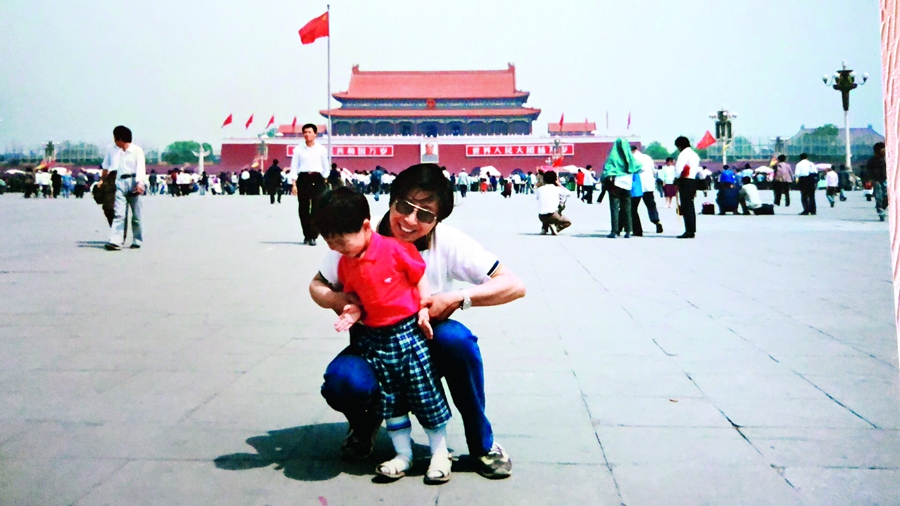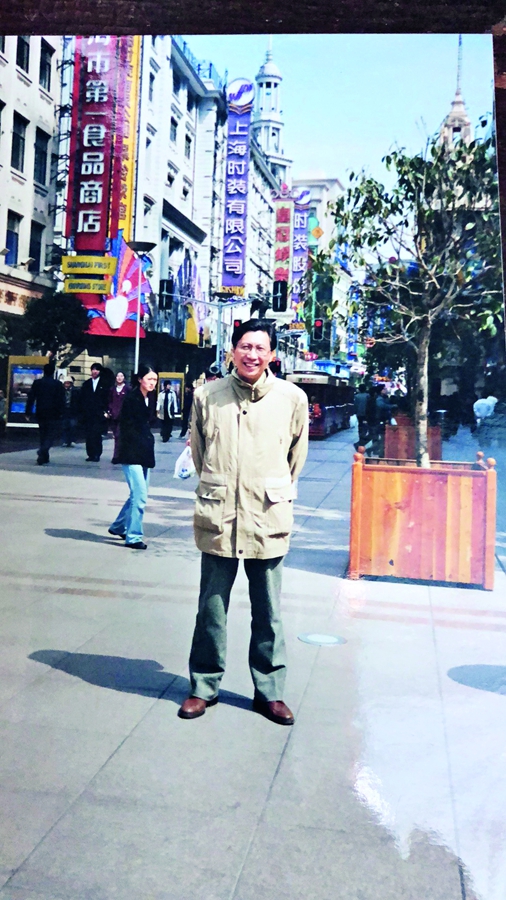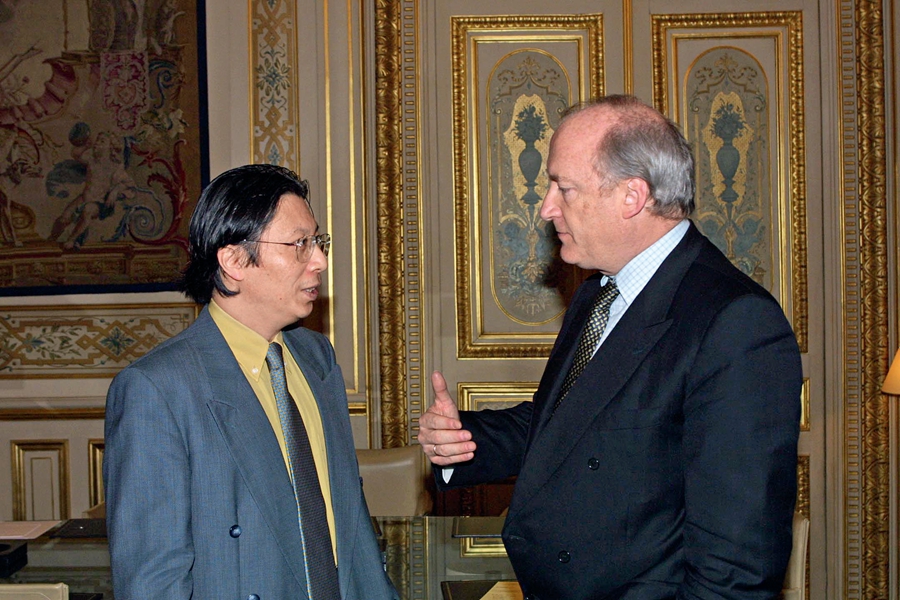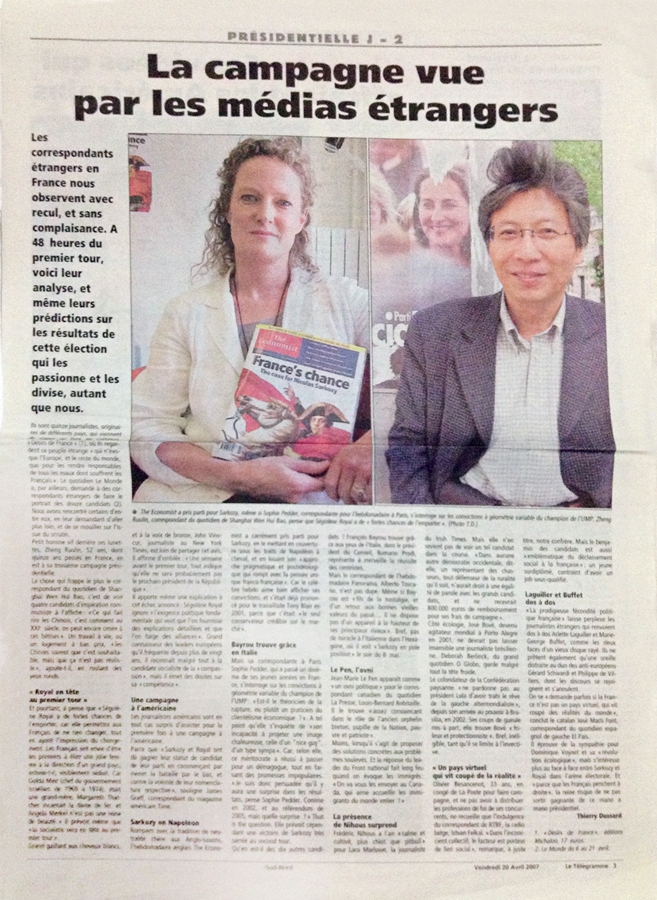By ZHENG RUOLIN
By ZHENG RUOLIN
FORTY years ago, in 1978, I was working in a factory in Shanghai. At that time, the gateway to foreign countries seemed to me even more remote than that of paradise. I had already heard of the French Republic, but only because my father was Zheng Yonghui, an illustrious literary translator who spoke fluent French.
My father was born in Vietnam (formerly under the control of the French colonial empire), but at a very young age he arrived in Shanghai, and then continued his studies in this city at Aurora University (a preeminent Catholic university in Shanghai from 1903 to 1952). Since childhood, he was passionate about French literature and bought piles of French literary works. So, in 1978, at a time when he did not have a job, he had plenty of time to “interpret” French classics for his three children, including me.

The author with his son in Tiananmen Square before leaving for France in 1988.
In 1979, I made the choice to study French at university. At the time, I had planned to walk in the footsteps of my father and maintain the flame of Sino-French cultural exchanges. I started translating French literary works into Chinese. But very quickly, I was daunted by the difficulty of the task. Translating is not easy. It is an exercise that requires not only perseverance, patience, and determination, but also strong language skills and a high level of education, not forgetting the most important, namely a thorough understanding of France.
After graduating from university in 1983, I turned to the world of the press and became a journalist for China Youth Daily. This newspaper, full of ambition, planned to set up a correspondence office in Paris. Obviously, as I was then the only French-speaking journalist on the editorial team, I was the perfect candidate to go to the French capital.
First Step Abroad
In 1988, for the first time in my life, I went to France. The UNESCO Youth Club invited me to write a book about UNESCO and youth, as UNESCO intended to spread its purpose and promote these “Youth Clubs” in China. At the time, it was extremely rare for a Chinese to go abroad.
I spent three months in France, enough time to conduct interviews and have a brief overview of the country. It was a great first for me: the first time I left my country, the first time I set foot on European soil, and the first time that I discovered with my own eyes a developed country!
To be honest, in 1988, the gap between China and France was broad. For example: that year, my monthly salary was only RMB 56, the equivalent of 47 francs, while the minimum income in France exceeded 4,000 francs! But I was less shocked by the material gap than by the intellectual gap. At that time, in China, the Internet and private print media did not exist yet. So when I arrived in France, I was immediately struck by the richness and diversity of French publications, especially non-governmental and even anti-government publications. I was stunned!
It made me want to study in France. I had this opportunity thanks to the Shanghai-based daily Wenhuibao, from which I won a scholarship. Therefore, later in 1988, I returned to France to join the famous journalism school CFPJ (Centre de Formation et de Perfectionnement des Journalistes), located on the rue du Louvre in Paris. It’s a private school, and my scholarship just covered my living expenses. However, I reached an agreement with the school: as I was the first Chinese student to ever study there, I proposed to found a Chinese club, where I would organize free lectures about China; in return, the school exempted me from my tuition fees. To be honest, at that time, few French people were interested in China. As a result, throughout my year of study, I held only one lecture.

The author on a visit to his family in Shanghai on returning from France in 1992.
At the end of 1989, while my study was coming to an end, a French publishing house, La Découverte, approached me. It was preparing to publish a collection called L’Etat du Monde (The Current Situation of the World), which would include a book on China, called L’Etat de la Chine (The Current Situation of China). The then editor-in-chief, Pierre Gentelle, invited me to write a chapter on Chinese media, which I did a bit hastily. Frankly speaking, I did not well understand France or China at the time.
But again, at that time, how many people in the world (including the Chinese) understood China? Twenty years later, I reread this book, and noticed that almost all the most famous sinologists today had worked on this book, which means that this book had already reached the ultimate level reached by French research on China. But I must say that in this book, almost all the predictions made about the future development of China have been belied by the facts. However, it is not the fault of Pierre Gentelle, but rather the “fault” of China: who could have believed that this country would become the second largest economy in the world 20 years later?
For an Objective Understanding of China
At the end of 1990, I finally saw my wish granted as I was sent to Paris as a permanent correspondent for Wenhuibao. At that time, the Chinese had limited knowledge of the outside world, including France. Only about a dozen Chinese correspondents were permanently settled in France, and the number of French correspondents in China was even lower. One could say that these two countries were observing each other “through a keyhole” which prevented them from having a general overview.
As my knowledge of France deepened, I had a relatively reliable frame of reference to compare with my own country. Gradually, I got to know myself better and realized that I knew very little about my country. China translates into a very complex reality, with its multiethnic population, its profound history, its immense territory, its composite society ... Not easy for us, the Chinese, to know China!
In Paris, little by little, I became acquainted with the vast majority of sinologists who had written articles in L’Etat de la Chine. I often quoted their points of view in my reports. But soon, I realized that they were content to criticize China subjectively, because in reality they did not know much about this country and did not understand it at all. Some of them had traveled to China for a short time; others had never gone to China or had left there years earlier and had not set foot there again; still others, even if they resided in China, could not get rid of their prejudices about this country. In short, their Chinese language skills were very limited and their understanding of the Chinese reality was often scant.
On top of this, they relied excessively on those they called “dissidents” exiled in the West or Hong Kong to try to know China. Consequently, they have never managed to grasp the essential fact that China has taken off on the “fast track” of industrialization. In recent years, it has grown at a relatively high rate of growth. This country, once lagging far behind France, has undergone a rapid transformation and has taken the place of the world’s second largest economy.

The author interviews former French Foreign Minister Hubert Védrine in 2003.
At that time, in order to help French readers understand China objectively, I went back to writing articles about my native country in the French media. Around 2005, I met Editor-in-Chief Jacques Bertoin and President Béchir Ben Yahmed of Jeune Afrique. At the time, official relations between China and France were close, because of President Chirac and the second Gulf War. However, I observed that the French mass media insisted on presenting the 1990s version of China in their reports. When I discovered that the French were, as one might say, “ignorant” about contemporary China, I was deeply saddened. As the old Chinese proverb says, “relations between two countries are rooted in friendship between peoples.” And this “friendship between peoples” obviously implies mutual understanding.
I then began writing articles about China in the weekly magazine Jeune Afrique and the monthly La Revue pour l’intelligence du Monde. I am very grateful to my dear friends, Renaud de Rochebrune and Jacques Bertoin, and their predecessor Béchir Ben Yahmed, for giving me this opportunity. They did not always share my point of view, but they recognized that my articles were based on facts, facts that the major French media were deliberately abstracting, and which sometimes went against the “politically correct,” but they always guaranteed my “freedom of expression.”
In an article, I pointed out that 100 million Chinese believed in various religions (including the three main currents of Catholicism, Buddhism, and Islam, but barring Taoism), which is higher than the number of Communist Party of China (CPC) members. At the time, this statement caused waves in the pool of French public opinion. Le Monde investigated this subject, ultimately proving that my statement was true.
Promote Mutual Understanding
Through writing articles on China, I made myself a name in the French media sphere. Some authors writing books about China began to quote facts and opinions that I exposed in my articles. That’s why in 2008, when unrest erupted in Lhasa, the TV feature Kiosque broadcast on TV5 Monde and other well-known television programs invited me to talk about this incident and the Chinese point of view about the Beijing Olympics. At the time, I was one of the few Chinese to make regular appearances on French television. My introduction to the Chinese reality has influenced a large number of French viewers. At the same time, I began to be invited by universities or non-governmental organizations to hold conferences on various topics related to China.

The author is interviewed by a French newspaper in 2007.
The more I deepened my understanding of France, the more I realized and confirmed that the three main channels through which the French learned about China (mass media, books, and films) were fundamentally inundated with negative information about China, while objective facts were often overlooked. It gave me the idea to write a book. After three years of work, I finished my book Les Chinois sont des hommes comme les autres (The Chinese Are People like the Others) in 2012. To my delight, all copies of the first edition sold out within three months. At least I have made my contribution to the building of mutual understanding between China and France.
I must admit that my book has had some success, thanks to a key factor: I know too well the level of knowledge of French public about China. I will take this very simple example: the French often condemn China to be a “dictatorship” governed by a single political party. After conducting extensive research on France, I came to understand that it was quite natural to have this idea, since the French political parties, failing to defend the interests of all the people, make themselves the “spokespersons of certain social strata.” For example, the Socialist Party is the party of the French middle class. With only 200,000 members, it governed 66 million French when President Hollande was in power: this is a situation of “one-party rule” in the minds of the French. (That is, the current President Macron’s party has more members, but 400,000 at most). In this context, France needs opposition parties.
But what the French forget is that the CPC is a party with more than 89 million official members paying their dues, defending the interests of all Chinese people. CPC members alone account for eight percent of the adult Chinese population. Let us add that, along with the ruling CPC, there are several other political parties in China that participate in political affairs and discussions, thus constituting a consultative democracy with Chinese characteristics. In comparison, in France, members of all political parties combined represent only one percent of the adult population of the country. At the end of the day, who sets the example in terms of representation? My research has allowed me to better understand the advantages and disadvantages of the Chinese model characterized by its one-party rule and the French model characterized by the alternation of parties in power. Thus, I was able to present the CPC to the French people by being more objective.
One day, I approached my father with the following question: finally, how to make the Chinese and French people know each other and understand each other? My father replied: “You have to know others in order to truly know yourself. Meanwhile, we must let others know us. It is something that is 10 times, 20 times more difficult than trying to know the other. We must therefore deploy 10 times, 20 times more effort to achieve it.”